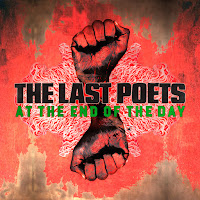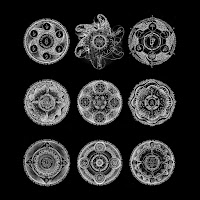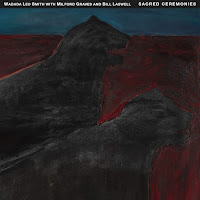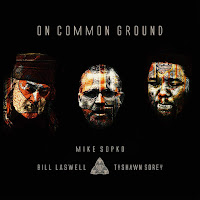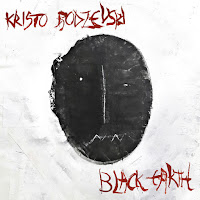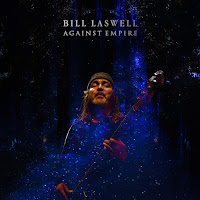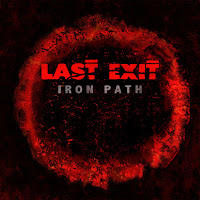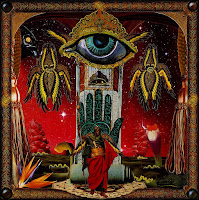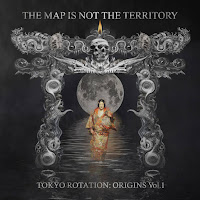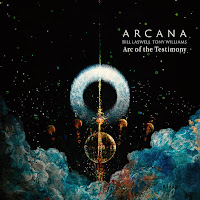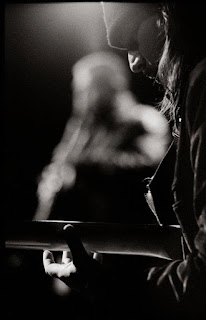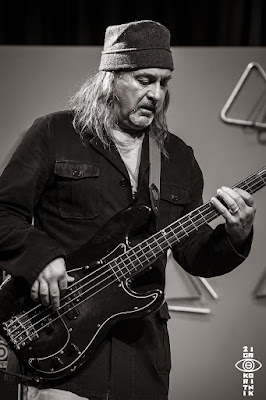 |
| Bill Laswell. Photo by Ziga Koritnik |
By Paul Acquaro and David Cristol
Both David and I have seen Bill Laswell perform a few times. For me, once at
the old Stone in NYC and once at the A’LARME Festival in Berlin, and for David, starting in 2003, seeing Material in France, then Massacre at Lisbon’s Jazz em Agosto, and in Milano in 2018 in duet with John Zorn – and each time he was a stoic, somewhat ghostly, musically giant presence. His influence in
modern music is, to me, similar. Whether as a player or producer, what he
touches bears his sonic imprint, expressed in the sound of the drums, and of
course, the bass, with elements of dub, funk, ambient and even a bit of jazz.
From his discographic beginnings in the downtown New York scene in the late
1970s with Material and Massacre, and working with, among many others, Brian
Eno, Ginger Baker, Laurie Anderson, Fred Frith and John Zorn, he has created
his own musical universe.
While a career breakthrough was, of course, creating ‘RockIt’ with Herbie Hancock in the early 1980s, introducing the world to
“electro-funk,” the credits really go on and on. (For a more comprehensive
listing, check out the Laswell discography at Dave Brunelle’s website
silent-watcher.) Laswell’s reconstruction of Miles Davis’ electric music,
Panthalassa, is a desert island disc. His vision for Davis’ electric music, presented as
fluid suite, flowed through my ears and cut new pathways in my brain. Filling
these pathways was then the music of
Arcana, with Derek Bailey, Tony Williams and later Nicky Skopelitis and Buckethead
as well as Last Exit, with Peter Brötzmann, Ronald Shannon Jackson and Sonny
Sharrock.
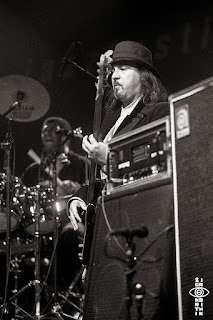 |
| Photo by Ziga Koritnik |
In 2020, Laswell released Against Empire, a stunning atmospheric album with contributions from Pharaoh Sanders
and Hancock. A duo album with John Zorn, Memoria, came out this year –
essentially a freely improvised meeting of two friends and masterful musicians.
However, Laswell’s ability to work in recent years has been greatly impacted by
health issues. A
Go-Fund-Me
was established in 2018 to help him with maintaining his famous Orange Studio
and continues to provide support for him as he manages his health. Additionally,
a new subscription effort through Bandcamp,
BASSMATTER, was launched in 2020 to make music from his wide-ranging recorded corpus
available.
Earlier this fall, we had an opportunity to chat with Laswell from his home in
Inwood, New York City, where he is recuperating and continuing his mixing and
production work, to talk about some of the music that can found on the
Bandcamp site, as well upcoming work, and a bit more. In addition, some of his
colleagues from over the years, namely Bachir Attar, Hamid Drake, Kristo Rodzevski, Akira Sakata, Wadada Leo Smith,
John Zorn, as well as Slovenian photographer
Ziga Koritnik,
share some thoughts.
***
The Interview
Free Jazz Blog: I’d like to start asking how are you doing? We know that
you’ve been dealing with some health and other issues with the studio, but
at the same time, you’re keen on writing another chapter.
Bill Laswell: Well, yeah, I think I can get one more.
FJB: What would you like to see in there?
BL: I just want to continue. There’s a lot of records that I’ve done
that need to come out. We have to work on that. And I have wanted to do a lot
of drum and bass records without so much music. Just rhythm. There are a few
key people that I would work with and want to work with. But again, there’s
quite a few things in the can that should come out soon.
FJB: About some recent and upcoming projects. In 2020 you started getting a
dazzling number of unreleased live recordings out there, from different eras
and bands that you had organized.
BL: Yeah, that’s still going on. It’s on Bandcamp. Why do you do music
in the first place? It’s so people can hear it. And there is a kind of base of
people that want to hear it, so, you know, I keep digging it out and we put it
on Bandcamp and there’s a subscription that gives access to it. You can get
all that stuff from digital places.
FJB: Yeah, the subscription model is interesting. How has that been working
for you?
BL: I don’t monitor it so much, but I think it’s going OK. It’s not
really selling because the thing is, it’s more to do with people getting
access to things that they would normally not have heard. I’m glad that people
hear it and it’s a good document and it measures history in a way. I like the
idea.
FJB: How many recordings would you say you have unreleased?
BL: Not many. I have the things that are finished and that will be
coming out soon. That’s unreleased as of now. But I don’t keep a lot of things
around that are unreleased. I try to use all.
FJB: As you have gone back to the vaults, were there any projects that you
heard differently than you remembered?
BL: All of them, you know, it’s a long time ago. There’s a lot of
music there and a lot of live recordings. I don’t go back to my vault because
I don’t have a vault. And I don’t know how to go back, so…
FJB: I’d like to ask about an upcoming album with The Last
Poets…
BL: It should come out soon. Pharoah Sanders played on it. I’ve worked with The
Last Poets for many years. A few years ago, I said let’s make a record and go
back to the original idea which is just rhythm, percussion and voice and then
add a few sounds from Pharoah and Graham Haynes. And that’s how this happened.
The Poets have done a lot of releases, with bands and one was reggae, one was
kind of fusion… We did one that was heavily funk-influenced, Holy Terror, back in
the 90s. I wanted to go back to the original source, reel it in and bring it
back to this kind of African concept, rhythm and voice for the most part.
FJB: What about other upcoming albums?
BL: I also have Massacre live in Japan. And one with Sam Morrison, who
played with Miles Davis. That’s a really good record. And I want to do this
project with Ginger Baker. Of course he’s gone; but we have tapes. And the
Revelator band with Peter Apfelbaum, Will Bernard and Aaron Johnston. I really
want to do something with Sly Dunbar again. We’ve been in touch.
FJB: On Memoria, a recent recording you did with John Zorn, the titles
are dedicated to Wayne Shorter, Pharoah Sanders, Milford Graves. What connects
these artists, besides that you worked with them?
BL: Not everything needs to connect, but it often does. These are
human beings. They live on the earth. They make their contributions or they
don’t. And you know, these guys did a lot. And we just mentioned their names.
Because of their willingness and openness to give and to share and to bring
all this music to the world and they all did. So, it’s just congratulations to
them.
FJB: It’s very intense and has a lot of texture to it. You have a
long-standing collaboration with John Zorn, of course. What has helped
create that connection?
BL: It’s been many years, yeah. We couldn’t be more different in terms of
music, but there’s a level of intelligence that I find in him and some of the
things that we value are similar, but it’s not from music so much. It’s
writers and painters, film makers, that connection and not so much music. We
come from very different backgrounds. And it’s always been kind of interesting
to me to do that.
FJB: You’ve done a lot of work in recent years with trumpet players Wadada
Leo Smith and Dave Douglas…
BL: Wadada called me and I did a lot of things with him, we didn’t tour anywhere
but we played a little bit in New York. And we did a few records and it was
always good for me. Dave Douglas, I met through Zorn and we did a recording with
Louie Belogenis and Tyshawn Sorey [“Blue Buddah”, on Tzadik]. Also a live
recording with Dave and drummer Hideo Yamaki, “The Drawing Center”
[released in Japan, 2017]. And he invited me on some recordings
[“Uplift”, Greenleaf, 2018] and a short tour in Europe
[with Mary Halvorson, Jon Irabagon, Rafiq Bathia, Ian Chang and Ches Smith]
. I’m grateful I am able to do it, because I’m not a jazz musician. They don’t
put down the sheet music and I play the charts, nothing like that, but I enjoy
being in those bands where I have no idea what they’re doing and I just sort of
play along.
FJB: Then you must have an amazing intuitive feel!
BL: Well, I hope. I hope that’s the case.
FJB: What about a trio like “On Common Ground” with Mike Sopko and Tyshawn
Sorey? With a group like that, do you have a concept beforehand, or is it
improvised?
BL: That was Mike Sopko’s idea, he had the drummer and he wanted to do
a record. We did it very quickly, and I enjoyed working with them. I’m sure
Mike has a concept, but I don’t. I don’t like to put music into these designs.
That’s why I like to play in these bands where they have structured music,
written music and I just sort of try to make it work for myself. I like that a
lot. With Zorn it is all always improv but with other people, they have their
own music and I just kind of improvise around what they have, finding my way
into the music.
FJB: With John Zorn, how might that work? Would you start with a bassline,
or an idea, or John would play something?
BL: You don’t think like that, you just play and you know we’ve been
doing that for so long that I think we have a repertoire, a language, and we
just talk like that, with that language and bring back the memories and go
forward into the future.
FJB: We’ve been talking about all these recordings that you’re releasing and
some other ones that have been released with Ulf Ivarsson, Kristo Rodzevski,
Simon Berz, Monte Cimino, there’s a whole bunch, a full spectrum of aesthetics
from ambient to dub global to electronic and other styles. Do you enjoy
juxtaposing so many styles?
BL: I’m existing, continuing, and trying to survive at the moment, but
I don’t see it as styles, and I certainly don’t like the idea of juxtaposing
them or juggling them. It’s music to me. I have been lucky to have the time to
understand, or misunderstand, the concept of sound. It’s all about the sound.
I don’t play styles, I don’t play genres, I don’t play jazz. I play my
repertoire, my language, my own poetry.
FJB: Earlier you were mentioning a recording of Massacre in Japan that
you’re planning to release.
BL: That should come soon. I don’t know how everybody else feels, but
I thought it was the best thing we ever did, and that’s a heavy thing
considering I started with Fred [Frith] in the late 70s. Charles Hayward
described it as telepathy, like we were communicating on an outside of the
space, outside of the environment that you’re in, and he had it right, the
word is telepathy.
FJB: About the creative process or just sort of how music develops like we’ve
been discussing, I want to ask you about Against Empire your album from
2020. This one features a rich cast of musicians, with Pharoah Sanders, Peter
Apfelbaum, even Herbie Hancock to some extent, and others. And the music is
seamless, very fluid. How did this one come to be?
BL: I think that’s an intuitive approach to production more than
playing. Things come in from different angles. Like something someone played
might have been five years before, and it all just collides, and when it’s
right, it just flows, and I felt really good about the work.
FJB: I feel it when listening to it, it’s really a cohesive piece.
Was there live playing or composition that went into this?
BL: A little of everything. It’s improv, it’s juxtaposing improv, and
creating composition. It’s using technology to arrange music, to place it,
tune it, make it relate. There is a certain degree of that there, but there’s
also just that you rely on your experience and your concept of freedom with
sounds.
FJB: With all of the advances that we’re hearing about and experiencing
with artificial intelligence, do you see a place for it in music making?
BL: Absolutely. I don’t know how, when or where, but of course.
FJB: This year marks the 40th anniversary of Rock It and the Future
Shock album. That was an absolute paradigm shifter for everyone, mixing
hip-hop and electronics and jazz in unique and new ways. I’m wondering just
how you feel about this recording now, looking back on it?
BL: Well, I made it but you know, I don’t think about it so much. When
you’re in the process of creating it, you’re not thinking, you’re applying the
means and the delivery of your current experience and it’s spontaneous, and it
all happens very quickly. If it doesn’t happen quickly, it won’t happen.
FJB: You then embarked on a much different adventure with Last Exit.
BL: Last Exit was a little later, from ‘86 to ‘89 on and off, and it
was just a way to get away from pop music and obligations and record labels.
It was kind of fun to do.
FJB: I think there was a little bit of a crossover? Herbie Hancock guested
with Last Exit.
BL: In Japan, yeah, just one concert.
FJB: Regarding Last Exit, you worked with very strong personalities there,
Peter Brötzmann, Ronald Shannon Jackson, Sonny Sharrock. What was the creative
process like in the group?
BL: It was improvisation then. I had a band with Brötzmann and we were
working with Fred Frith and Anton Fier, and there was a tour that came up, and
both Fred and Anton were busy. I had been working with Shannon Jackson and I
said, “well, why don’t we keep Brötzmann and let’s bring in Sonny Sharrock.”
We started in Europe playing festivals, it was pretty intense. We carried on
with that for a few years.
FJB: You worked with Brötzmann and Pharoah Sanders and
Ryuichi Sakamoto, Toshinori Kondo. Looking
back, what was it like working with these folks?
BL: It was like friendship and camaraderie. They’re your friends and
you go out and you play and you hope people like it, then if they don’t, so
what? For the most part, it always worked. All those guys are dead. Sakamoto,
Kondo. All of Last Exit.
FJB: Your last concerts were with Method of Defiance in early 2020. Do you
miss playing live?
BL: Not so much. I don’t miss flying on planes and taking a car to the
hotel. I’ve been everywhere twice, so I don’t need to go back. I’m good. I
just need to try to record as much as I can. Performing live is a lot of work,
and traveling is a lot of work.
FJB: Do you feel there’s a big difference? Between what you get from
playing live compared to what you do in the studio?
BL: It’s not the same of course, but it’s pretty connected, very much
connected.
FJB: Are there any trends in music today that you find interesting?
BL: I used to listen to everything. I mean, absolutely everything. And
lately not so much. And if I had to name 10 people that are great, that are
doing good things, and are new, I probably wouldn’t be able to do that.
Nothing new is going to happen, but there are going to be great things coming,
that’s a definite, but are they new things? Something you haven’t heard
before? Everything that you’re going to hear, you’ve heard before. It’s just
going to be in different contexts.
FJB: You’ve done a lot of recordings with percussionists and drummers like
Hamid Drake, Jack DeJohnette, Tony Williams. Drummers are often at the
forefront of your work, even Against Empire, which we spoke about, is
built around four drummers. What is the importance of drums in your work?
BL: Well, you know, it’s the foundation in most cases, so building on
rhythm and it’s usually the core foundation of building something. It depends
on the drummer, if it’s innovative drummers, you can really build on it. If
it’s just somebody playing a beat, doesn’t really matter.
FJB: I would say that your approach down to mixing really brings the drums
to the forefront, very clear. Is that something that you consciously
developed or was it more intuitive?
BL: Both really. If it’s innovative drumming, you want to hear every
detail, so you bring it up and push it to the front.
FJB: You have produced hundreds of recordings in addition to your own
projects. Are you very selective when you get involved with the process?
BL: I guess so, yeah, probably before I get involved. It depends on
the work and who’s involved. If it’s for me, I look to just make it the best I
can. I’m obliged to be in charge of something. If it’s for someone else, I
take a different approach, because everyone’s got different opinions about it.
FJB: How much would you say you influence such projects, the ones that you
are producing? And what might be the first thing you do when you get to work
on a new project?
BL: Well, quite a bit, you know. Otherwise I wouldn’t be there, or I
wouldn’t be needed really to do it. Everything is different, it depends on
what the work is and everything is going to have a different beginning.
FJB: Do you often have a complete idea of what you think you’ll end up with
when you start?
BL: Sometimes I do, not always. But sometimes I do.
FJB: Looking over your Bandcamp site, something that caught my eye were the
recordings of your Stone and other residencies. What do you recall from
putting these together?
BL: Well, it’s not curating work really. I got people involved that I
respected or I thought were doing something good and, in some cases, just
needed exposure.
FJB: Then in addition, there’s the one called the
Tokyo Rotation. Did these come from events that you organized as
well?
BL: Well, that was the five years of where once a year, we would do a
series of concerts in the same venue and it was all Japanese musicians and
again picking people that I liked and that I worked with and I thought might
be interested and you know it goes like that. A lot of great musicians played
there, that impressed me.
FJB: Another thing that strikes me is all the different album covers. There’s
a real aesthetic sense. It’s often a dark or mysterious imagery. How do you
decide on the artwork? How do you conceive or think of it? Are there any
recordings whose artwork you think really matches the music?
BL: Well, I hope that it fits the music and I have a lot of help with
that. There’s so many… Against Empire, Arcana with Tony
Williams. But there’s a lot, I can’t just name two or three. Hundreds of them.
FJB: Going back to people you have worked with, one relationship I’d like
to ask about is with Ornette Coleman. What was your relationship like?
BL: When I came to New York in the 70s, my kind of goal was to meet
Ornette Coleman and maybe Miles Davis. And I met them both right away. With
Ornette, he always lived kind of near where I was. I started going to his
place and invite him to concerts I was doing and stayed in touch with him for
a very long time. It was a good experience. We did play in his loft and I
recorded everything, I’m going to release a record in the next year or two.
Just bass and saxophone. We released a track a couple years ago. Ornette
influenced me on just being independent and having your own idea, you own
concept about sound and music, I guess that’s the way it went.
FJB: Your creative path spans many different sound worlds and
collaborations, likely contains many stories. Do you have any plans of
working on an autobiography?
BL: No, but I would like to. I just have to have the right people
involved. I don’t have that at the moment, but there are a couple of people
doing books and I hope they do the right thing.
FJB: I just I wish you the best with everything and I really look forward
to hearing more from you.
BL: Well, you will, if I can get it together you’ll hear it. You just
wait. And listen. And then you make up your own mind. I hope I can do more
work and you look forward to getting some work.
***
Some Links:
- Bachir Attar, Hamid Drake, Kristo Rodzevski, Akira Sakata, Wadada Leo Smith,
John Zorn, Ziga Koritnik on Bill Laswell:
https://www.freejazzblog.org/2023/12/against-empire-co-conspirators-weigh-in.html - BASSMATTER Bandcamp subscription site:
https://billlaswell.bandcamp.com/bassmatter
- Support Bill Laswell:
https://www.gofundme.com/f/emergency-please-help-bill-laswell

